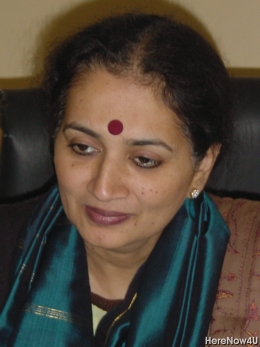
It was mid-summer. As the sun rose over their heads, the group of hot and thirsty travellers grew desperate for water. At last, they came to a waterfall. One of the travellers stepped forward to cup his hands to drink water when his eyes fell on a board that said, "Accept me as your ideal". How could a waterfall be an ideal? One of them said: "I think I know why. The waterfall is gatishil - it represents constant movement or progress. It is always moving ahead. To do so it is continuously making effort. It is so hardworking. That which incorporates pace into its very being is worthy of being an ideal."
Everybody agreed and looked at the hurrying waters with new respect. "I think there is yet another dimension," said another. "One who is of use to others can be an ideal. The waters quench everybody's thirst, they make no difference and they charge no price. Their cool waters must be giving relief to many a weary traveller. Where there is utility, a vision of the ideal can be seen."
A third person remembered how they had chanced upon the waters and said, ''The waterfall is useful because it is nirmal, pure. Nobody would drink dirty water. So, its pavitrata or purity makes it qualify as an ideal."
The words on the board represented a waterfall that brought together the attributes of inbuilt prog-ress, utility and purity. With gratitude the travellers drank the water that had taught them such a valuable lesson and went their way.
Says Acharya Mahaprajna, "We too have to move in the same direction as the waterfall. When something is no longer useful, it is forgotten. When winter comes, cottons are put away. And when summer comes, woollens are put away. That which is not useful also lies locked up. So one should be of use to one's immediate surroundings, to society in general.
"An essential feature of development is pace. There has to be constant movement. Lethargy is man's enemy. I have tremendous faith in shram (hard work). The shraman parampara has laid great stress on hard work. The very word shraman embodies three meanings: shram which is hardwork, sam which is equality and sham which is to assuage.
"Sam means balance or equality. Where the ground is flat it is so much easier to walk. It is vishamta or inequality that creates pro-blems. In my travels I find I am introduced, in every village, to a "big man". They tell me, "He is a very big man". Bigger than whom? Big or small is a relative idea. It is associated with feelings of superiority and inferiority. Both these feelings give birth to hinsa or violence. Man should be looked at as a human being and not in relation to his position in society. And why do such feelings arise in the first place? Because we suffer from emotional highs and lows. We feel inferior or superior, we like or hate people, and we are constantly interacting with our emotions, not through a balanced perspective.
"The third aspect, therefore, is sham deriving from upsham or controlling one's emotions. To hold emotions in control is very important. A little reflection before action always produces better results. If emotions are controlled, no man will be vie-wed as small or big, no work will be shirked. Our life too will become ideal like that of the waterfall for we will have enmity towards none, not even our very own self."
(JVBI is organising an open discussion, "Emotions and Us", on December 13, Saturday, at IIC Annexe, New Delhi, at 6.30 p.m. Experts will talk of how to deal with depression.)
 Sudhamahi Regunathan
Sudhamahi Regunathan